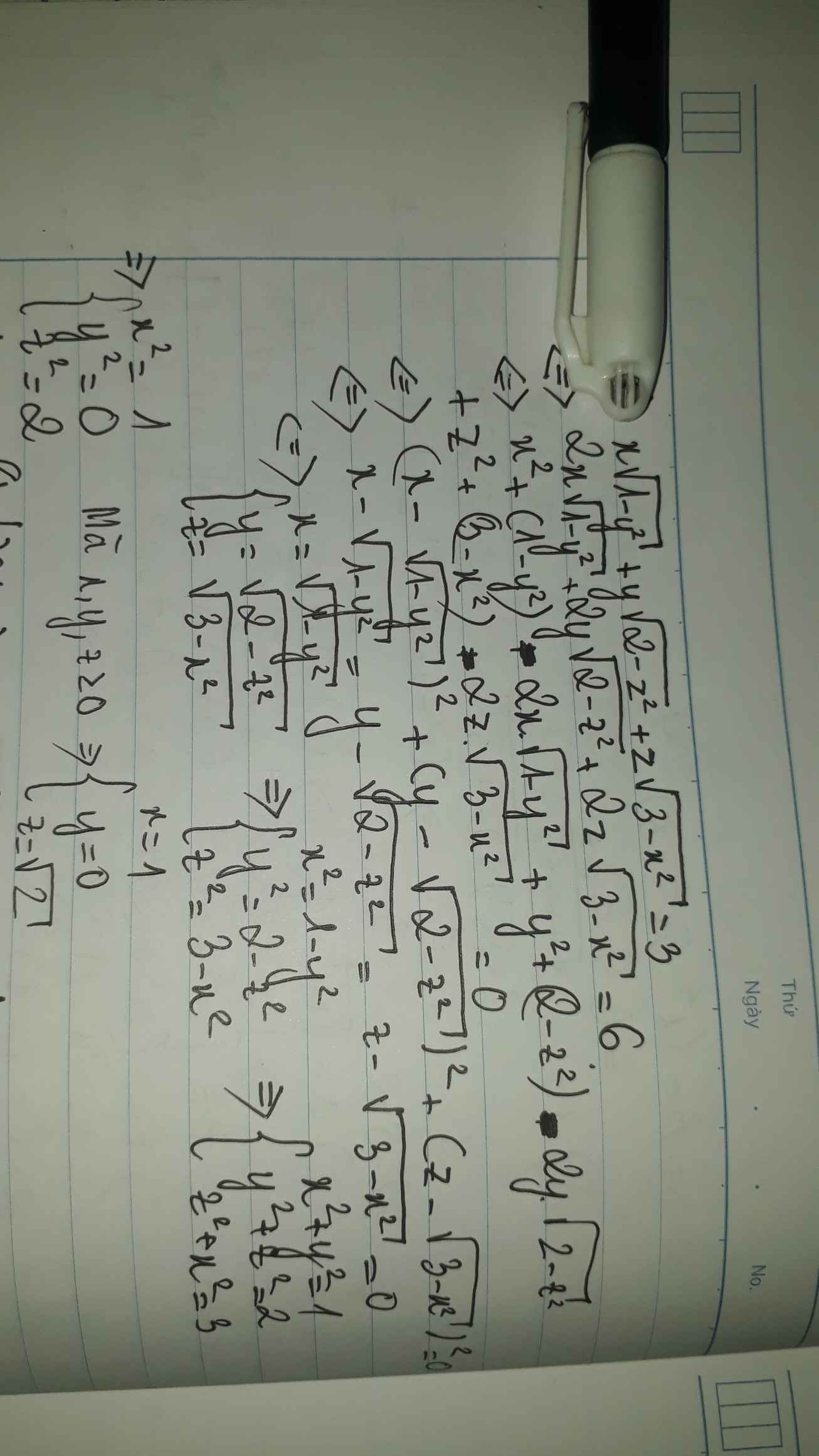Hãy nhập câu hỏi của bạn vào đây, nếu là tài khoản VIP, bạn sẽ được ưu tiên trả lời.

Bài 1: Áp dụng BĐT AM-GM ta có:
\(1+x\ge2\sqrt{x}\)
\(x+y\ge2\sqrt{xy}\)
\(y+1\ge2\sqrt{y}\)
Cộng theo vế 3 BĐT trên ta có:
\(2\left(1+x+y\right)\ge2\left(\sqrt{x}+\sqrt{xy}+\sqrt{y}\right)\)
\(1+x+y\ge\sqrt{x}+\sqrt{xy}+\sqrt{y}\Leftrightarrow VT\ge VP\)
Đẳng thức xảy ra khi \(\hept{\begin{cases}1+x=2\sqrt{x}\\x+y=2\sqrt{xy}\\y+1=2\sqrt{y}\end{cases}}\Rightarrow x=y=1\)
Khi đó \(S=x^{2013}+y^{2013}=1^{2013}+1^{2013}=2\)
Bài 2: Vì \(\hept{\begin{cases}x,y,z\in\left[-1;3\right]\\x+y+z=3\end{cases}}\) nên
\(0\le\left(x+1\right)\left(y+1\right)\left(z+1\right)+\left(3-x\right)\left(3-y\right)\left(3-z\right)\)
\(\Leftrightarrow0\le4\left(xy+yz+xz\right)-8\left(x+y+z\right)+28\)
\(\Leftrightarrow0\le2\left(xy+yz+xz\right)+2\)
\(\Leftrightarrow x^2+y^2+z^2\le x^2+y^2+z^2+2\left(xy+yz+xz\right)+2\)
\(\Leftrightarrow x^2+y^2+z^2\le\left(x+y+z\right)^2+2\)
\(\Leftrightarrow x^2+y^2+z^2\le3^2+2=9+2=11\)

Lời giải:
Áp dụng BĐT Cauchy-Schwarz:
\(F=\frac{x^4}{x^2\sqrt{y}}+\frac{y^4}{y^2\sqrt{x}}\geq \frac{(x^2+y^2)^2}{x^2\sqrt{y}+y^2\sqrt{x}}=\frac{4}{y^2\sqrt{x}+x^2\sqrt{y}}\)
Áp dụng BĐT Bunhiacopxky kết hợp AM-GM:
$(y^2\sqrt{x}+x^2\sqrt{y})^2\leq (y^2+x^2)(y^2x+x^2y)=2xy(x+y)$
$\leq (x^2+y^2)\sqrt{2(x^2+y^2)}=2\sqrt{2.2}=4$
$\Rightarrow y^2\sqrt{x}+x^2\sqrt{y}\leq 2$
$\Rightarrow F\geq \frac{4}{y^2\sqrt{x}+x^2\sqrt{x}}\geq \frac{4}{2}=2$
Vậy $F_{\min}=2$. Giá trị này đạt tại $x=y=1$
Lời giải:
Áp dụng BĐT Cauchy-Schwarz:
\(F=\frac{x^4}{x^2\sqrt{y}}+\frac{y^4}{y^2\sqrt{x}}\geq \frac{(x^2+y^2)^2}{x^2\sqrt{y}+y^2\sqrt{x}}=\frac{4}{y^2\sqrt{x}+x^2\sqrt{y}}\)
Áp dụng BĐT Bunhiacopxky kết hợp AM-GM:
$(y^2\sqrt{x}+x^2\sqrt{y})^2\leq (y^2+x^2)(y^2x+x^2y)=2xy(x+y)$
$\leq (x^2+y^2)\sqrt{2(x^2+y^2)}=2\sqrt{2.2}=4$
$\Rightarrow y^2\sqrt{x}+x^2\sqrt{y}\leq 2$
$\Rightarrow F\geq \frac{4}{y^2\sqrt{x}+x^2\sqrt{x}}\geq \frac{4}{2}=2$
Vậy $F_{\min}=2$. Giá trị này đạt tại $x=y=1$

P = x4.y4 + x4 + y4 + 1
Ta có: x2 + y2 = (x + y)2 - 2xy = 10 - 2xy => x4 + y4 = (x2 + y2)2 - 2x2y2 = (10 - 2xy)2 - 2(xy)2 = 100 - 40xy + 2(xy)2
=> P = (xy)4 + 2(xy)2 - 40xy + 101 = [(xy)4 - 8(xy)2 + 16] + 10.[(xy)2 - 4xy + 4] + 45 = [(xy)2 - 4]2 + 10.(xy - 2)2 + 45
=> P > 45
Dấu "=" xảy ra <=> xy = 2
Mà có x + y = \(\sqrt{10}\) => x = \(\sqrt{10}\) - y => xy = \(\sqrt{10}\)y - y2 = 2 => y2 - \(\sqrt{10}\).y + 2 = 0
\(\Delta\) = 10 - 8 = 2 => \(y=\frac{\sqrt{10}+\sqrt{2}}{2}\)=> x = \(\frac{4}{\sqrt{10}+\sqrt{2}}=\frac{\sqrt{10}-\sqrt{2}}{2}\)
vậy P nhỏ nhất bằng 45 khi x = \(\frac{\sqrt{10}-\sqrt{2}}{2}\); \(y=\frac{\sqrt{10}+\sqrt{2}}{2}\)

P = x4.y4 + x4 + y4 + 1
Ta có: x2 + y2 = (x + y)2 - 2xy = 10 - 2xy => x4 + y4 = (x2 + y2)2 - 2x2y2 = (10 - 2xy)2 - 2(xy)2 = 100 - 40xy + 2(xy)2
=> P = (xy)4 + 2(xy)2 - 40xy + 101 = [(xy)4 - 8(xy)2 + 16] + 10.[(xy)2 - 4xy + 4] + 45 = [(xy)2 - 4]2 + 10.(xy - 2)2 + 45
=> P > 45
Dấu "=" xảy ra <=> xy = 2
Mà có x + y = \(\sqrt{10}\) => x = \(\sqrt{10}\) - y => xy = \(\sqrt{10}\)y - y2 = 2 => y2 - \(\sqrt{10}\).y + 2 = 0
\(\Delta\) = 10 - 8 = 2 => \(y=\frac{\sqrt{10}+\sqrt{2}}{2}\)=> x = \(\frac{4}{\sqrt{10}+\sqrt{2}}=\frac{\sqrt{10}-\sqrt{2}}{2}\)
vậy P nhỏ nhất bằng 45 khi x = \(\frac{\sqrt{10}-\sqrt{2}}{2}\); \(y=\frac{\sqrt{10}+\sqrt{2}}{2}\)


\(\left(x+9\right)\left(y+11\right)=12\sqrt{xy}\) hay \(\left(x+9\right)\left(y+1\right)=12\sqrt{xy}\) bạn?

Áp dụng BĐT Cô-si, ta có :
\(P=\frac{1}{\sqrt{x}}+\frac{1}{\sqrt{y}}+\frac{1}{\sqrt{z}}\ge3\sqrt[3]{\frac{1}{\sqrt{xyz}}}\)
Mặt khác, ta có : \(\sqrt[3]{xyz}\le\frac{x+y+z}{3}=1\)
\(\Rightarrow P\ge3\)
Vậy GTNN của P là 3 khi x = y = z = 1
Cách đơn giản hơn cách của anh Tùng:) sửa nốt là thực dương :V
Áp dụng bất đẳng thức Cauchy-Schwarz dạng Engel ta có :
\(P=\frac{1}{\sqrt{x}}+\frac{1}{\sqrt{y}}+\frac{1}{\sqrt{z}}\ge\frac{\left(1+1+1\right)^2}{\sqrt{x}+\sqrt{y}+\sqrt{z}}=\frac{9}{\sqrt{x}+\sqrt{y}+\sqrt{z}}\)
Xét bđt phụ \(x+y+z\ge\sqrt{x}+\sqrt{y}+\sqrt{z}\)với x,y,z > 0 ( cấy ni thì dễ rồi nhân 2 vào cả 2 vế chuyển vế là xong )
\(\Rightarrow P\ge\frac{9}{\sqrt{x}+\sqrt{y}+\sqrt{z}}\ge\frac{9}{x+y+z}=\frac{9}{3}=3\)
Dấu "=" xảy ra <=> x=y=z=1

\(1+x+y=\sqrt{x}+\sqrt{xy}+\sqrt{y}\)
\(\Leftrightarrow2\left(1+x+y\right)=2\left(\sqrt{x}+\sqrt{xy}+\sqrt{y}\right)\)
\(\Leftrightarrow2+2x+2y=2\sqrt{x}+2\sqrt{xy}+2\sqrt{y}\)
\(\Leftrightarrow2x+2y+2-2\sqrt{x}-2\sqrt{xy}-2\sqrt{y}=0\)
\(\Leftrightarrow\left(x-2\sqrt{xy}+y\right)+\left(x-2\sqrt{x}+1\right)+\left(y-2\sqrt{y}+1\right)=0\)
\(\Leftrightarrow\left(\sqrt{x}-\sqrt{y}\right)^2+\left(\sqrt{x}-1\right)^2+\left(\sqrt{y}-1\right)^2=0\)
\(\Leftrightarrow\hept{\begin{cases}\sqrt{x}=\sqrt{y}\\\sqrt{x}=1\\\sqrt{y}=1\end{cases}}\)
\(\Leftrightarrow x=y=1\)
\(\Rightarrow S=x^{2013}+y^{2013}=1+1=2\)